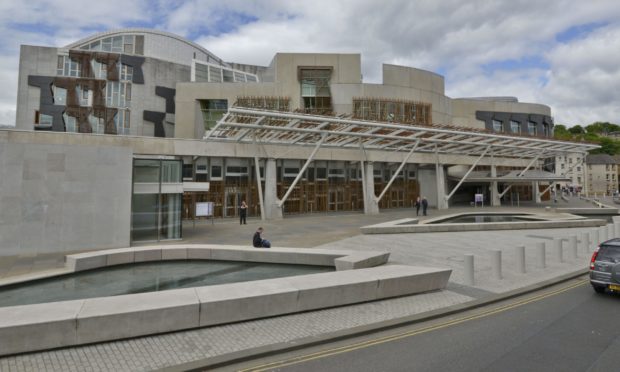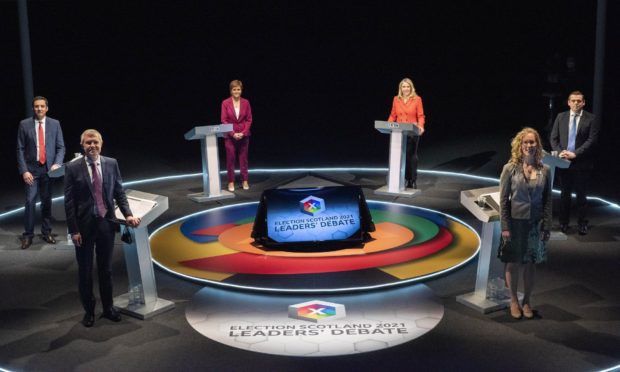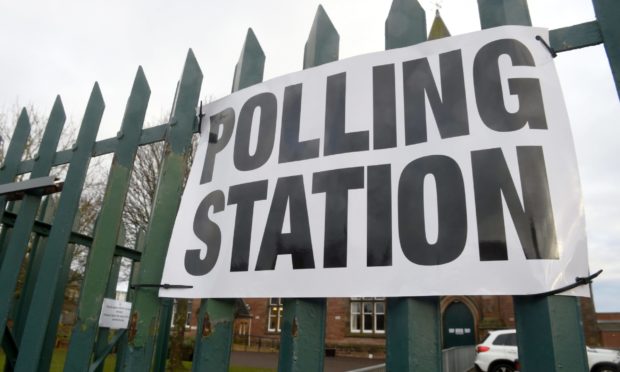Scotland’s politicians briefly came together in pledges to rebuild the country from the pandemic during the first televised debate of the Holyrood campaign.
The SNP’s Nicola Sturgeon was joined by Tory Douglas Ross, Labour’s new leader Anas Sarwar, Lib Dem Willie Rennie and Greens co-convener Lorna Slater.
The pandemic and the major recovery task ahead dominated, even with expected sparks flying on a future referendum, a divisive topic currently splitting public opinion, as shown in the results of polling commissioned exclusively for us.
But each leader tried to position their party as the best to steer Scotland out of the covid crisis.
Ms Sturgeon said she would be an “experienced hand at the wheel” – but drew criticism from opponents and some audience members, who appeared remotely, for wanting a referendum in the next two and a half years.
Scottish Conservative leader Douglas Ross, the MP for Moray, claimed: “We can’t have a recovery and a referendum.”
Mr Ross highlighted the coronavirus vaccine programme as being one of the strengths of Scotland being in the UK.
With more than half of all Scottish adults having had their first dose of the vaccination, he said: “That’s the union working for people right now.”
Battle for second place
The debate saw all five of the party leaders pledging to work to tackle abusive behaviour during the campaign. But it also prompted fiery exchanges between Mr Ross and Mr Sarwar – who appear locked in a tussle for second place on May 6.
Mr Sarwar, who is the first political leader from an ethnic minority background in the UK, said “It doesn’t matter where it comes from or who it is directed towards.
“Whether they’re on our side or a different side, we have a duty to condemn those perpetrators and show solidarity with the victims.
“That’s a cast-iron commitment from me.”
Mr Ross also pledged to root out abuse, claiming a member of the public said he “wanted to shoot me” outside parliament – while another asked for a “socially-distanced selfie”.

‘We need to put the division behind us’
He turned the debate back to independence and Labour’s refusal to form a unionist coalition, earning a “grow up” challenge from Mr Sarwar.
Despite the ongoing battle over the future of Scotland in the UK, domestic policies took up the majority of the exchanges.
The future of the NHS was central to the debate, with Mr Sarwar claiming the SNP had failed to support the service properly before the pandemic.
Focusing on the problems ahead, he raised the plight of a 69-year-old patient in Glasgow who faces travelling to London for cancer surgery.
Mr Sarwar said the family had been “told by the NHS in Scotland that due to the backlog of Covid, they are not treating recurring cancers, and would only be treating first-time cancers”.
Mr Rennie said: “After the dreadful year we have endured, I want to spend every second, every moment of the next five years of the parliament focusing on putting recovery first.”
He insisted: “This is not the moment for another referendum.
“We need to put the division behind us and bring the country together.”
Ms Slater, whose party supports independence, put climate change and a renewable recovery at the heart of her party’s pitch
But on the constitution, she said her party would commit to a referendum taking place in the next Holyrood term in its manifesto.
“Around the room we hear people who are in favour of the union not actually arguing for the union, but instead arguing that the people of Scotland shouldn’t have the right to choose,” she said.

